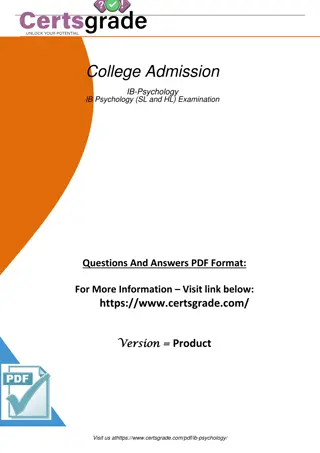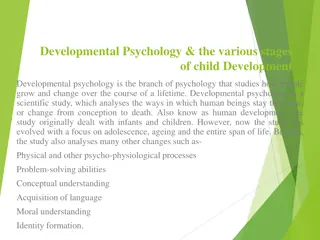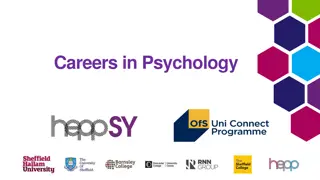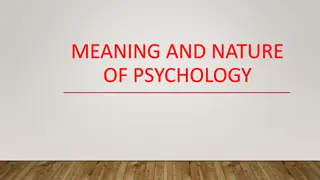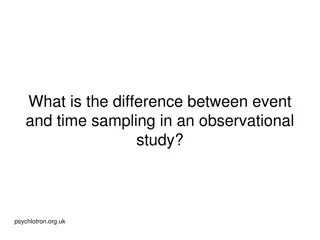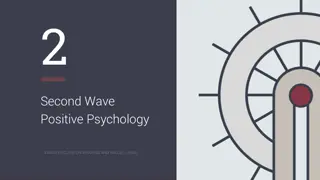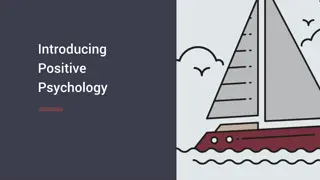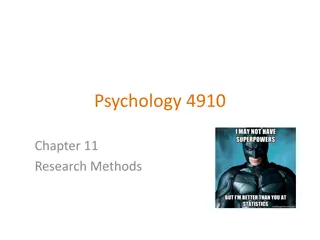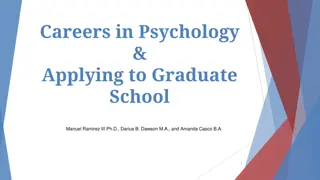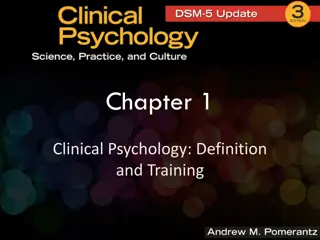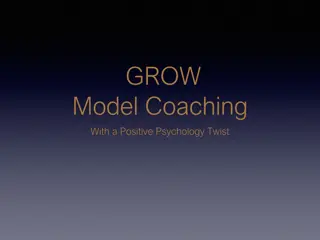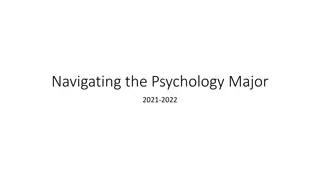Understanding the Evolution of Positive Psychology
Explore the historical journey and modern-day insights of positive psychology, covering key themes, applications in daily life, and debunking common misconceptions. From ancient philosophy to contemporary research, discover what truly brings happiness and fulfillment. Delve into experiments, learning outcomes, expectations, and the micro-history of happiness to gain a comprehensive understanding of the field. Uncover the principles, applications, and resources for embracing positivity and well-being in your life.
Download Presentation

Please find below an Image/Link to download the presentation.
The content on the website is provided AS IS for your information and personal use only. It may not be sold, licensed, or shared on other websites without obtaining consent from the author. Download presentation by click this link. If you encounter any issues during the download, it is possible that the publisher has removed the file from their server.
E N D
Presentation Transcript
Experiments in Happiness Mark Rice, Binghamton University Melissa Fallon-Korb, SUNY Oneonta David Walden, Hamilton College Deb Harper, Ithaca College CCNY @ Syracuse, June 4, 2015
Learning Outcomes 1. Learn at least 4 principles or themes in positive psychology. 2. Learn at least 4 applications of these principles in their work. 3. Receive resources (websites, books, apps, etc.) for pursuing further adventures in positive psychology.
Expectations and Attitudes What is an Experiment? Try it out AND see what happens along the way Audience expectations for today? Panelist initial attitudes, assumptions, in embarking on the experiments Dismantling the straw man criticism of positive psychology as a one-sided Pollyanna mindset
A micro-history of happiness 350 BC Early philosophers examined happiness as a characteristic of a good or virtuous life Aristotle reasoned that the final end of all we do is to produce personal happiness or eudaimonia. Fast forward to 1972, the Fourth Dragon King of Bhutan decided to focus on Gross National Happiness instead of Gross Domestic Product. Psychological well-being, health, education, community vitality, resilience, time use -- various aspects of a good life in individuals and in the community.
Positive psychology today 1978, early happiness research examined lottery winners and accident victims about their happiness. Turns out, people aren t good at predicting what will make them happy. Brickman & Janoff-Bulman, 1978, Journal of Personality and Social Psychology 36 (8): 917-927. 1954 Abraham Maslow used the term positive psychology in his book, Motivation and Personality. 1998 Martin Seligman chose Positive Psychology as the theme for his term as president of the American Psychological Association. 2002 Tal Ben-Shahar lectures at Harvard: How can we help ourselves and others become happier?
What makes us happy? Themes of Positive Psychology Happiness is the result of activities that bring meaning and pleasure in the present that also lead to benefit in the future. Tal Ben-Shahar Sample themes or elements of positive psychology: Positive emotions, traits, institutions Pleasure Relationships / Friendships Connection to something larger than yourself Sense of purpose or meaning .
What makes us happy? Themes of Positive Psychology Sample themes or elements of positive psychology (cont): Strengths and Virtues Optimism Generosity / loving kindness Gratitude Forgiveness Flow
Doorways into our / your Happiness Experiments Individual clients Theme based or process groups Professional development Self-care
Explorations of Happiness Will positive psychology work with THAT? Applying positive psych to minority stress Melissa Would positive psychology help me help them? Helping difficult clients David Who wants to be happy? All the anxious students Deb Experiments in a Happiness Group Happiness, suffering, and happiness Mark
Positive Psych & Minority Stress Victor Frankl and Man s Search for Meaning Erickson s crisis/resolution model of development Stress-related growth (SRG) (Vaughn & Rodriguez, 2014) Movie Selma https://www.youtube.com/watch?v=Yc7HYDt-rnM
Clients Jean, 22 y.o., white, senior with full ride to a graduate program, FTM, Preferred pronoun was he/him, living increasingly as a man over the year. Grew up in a small rural town with a very close knit and religious family. Presented with issues related to past trauma, family and transition to male. Past SI. Seen for 15 meetings Ronny, 18 y.o., Freshman, identified as Transgender/ gender fluid, Indonesian descent, Muslim, Preferred pronoun they/ them/their, very active on campus but B s and C s grade-wise. Depressed but not very vulnerable in session. Parent visits or breaks were very stressful for them. Needed to pass as male at home. Difficult roommate situation initially. No past SI. Seen for 3 meetings.
Interventions for minority stress: resilience based Coping strategies (Interdependence, Persistence, Sense of perspective, Flexibility of gender role) Social support (Group cohesion, Positive role models leading to positive self identities) Ethnic identity (Yager-Elorriaga, Berenson & McWhirter (2014) Exploration stage is not a protective factor Commitment/resolution stage is associated with hope and persistence
Interventions for minority stress: stress-related growth More knowledge and understanding of the nature of gender and sex & more complex understanding of the place of gender in their identity Character strengths/virtues proposed as SRG Creativity Bravery Authenticity Zest Love Social intelligence Citizenship Fairness
Client interventions Sensitive and nuanced understanding of gender to reframe and making peace and resolve ambivalence towards family and past gender policing/sexual abuse Creativity creating escape plans, asserting the authentic self, playing with gender. It s important to reframe this as creatively navigating expectations, not being fake or taking the easy way out. Bravery Defining survival as bravery. Talking outwardly about past suicidal ideation. Jean used past proof of his bravery to do new hard things
Client interventions Authenticity Naming and supporting authenticity. Regarding the mourning around Jean s family, It will be worth it. Ronny struggled to be authentic with friends, not trusting that they could handle him if he were authentically himself Zest Jean celebrating and being mindful when he passed, Trans conference at Penn State
Ethnic identity Ronny had some disdain for their Indonesian heritage, due to moves back and forth, and association with Indonesian culture with their father s rejection. They were in a commitment stage regarding their ethnic background. The resolution stage protected them from further rejection but did not provide a source of community or positive identity. Identified with Rupal s drag race, as if it were their adopted culture/community. Very involved in drag shows locally. Source of pride, community and role models. Concerns about the association with AOD. Jean Called his family hicks and disengaged from family culture. Resolution stage protected him from loss and rejection. Identified with campus LGBT community closely.
Ellas Critical Voice Sophomore, music major Referral from friend Relationship with Mom Separation Critical voice Triggering events Forgiveness Letter Focus Outcome
Laras Worries Sophomore, scholarship student Highly anxious skeet shooter 2 year relationship Primarily supportive Interventions don t stick VIA Quiz Reframing traits Shooting it down Reframing the quiz
Davids Busy Semester Super Senior Overwhelmed/exhausted Pre-existing issue with Dad Forgiveness Letter Avoidance Engagement Release
Debs Happiness Student groups evolved from work with staff/faculty Student Support Services Network (Fall 2011) staff support group: how can we help students? Workshop for faculty: Burnout: Rising from the ashes. Designing Happiness at Work. w/M. Tomaselli (March 2011) Weekly small group begins: Felicity group + neuroscience interests = Happy Brain (March 2013) CCNY workshop: Happiness at Work w/L. Brache-Tabar (June 2013)
Happiness Groups at IC Early groups: Designing Happiness Spring 2013 Fall 2014 (4 groups) brief (4-5 meetings, I hr/week, option to continue) psycho-educational, discussion, practice,support identification of common themes among attendees CAPS clients, closed Evolution: Peaceful Minds, w/co-leader,Brache-Tabar, Spring 2015 emphasis on quieting anxious mind Wheel of Awareness practice and sharing Next generation: Wheel of Awareness practice of components of wheel plus sharing, discussion
Happiness: What do we do? Format Discussion with prompts Practice (meditation, relaxation, visualization) Sharing Encouragement Weekly email reminders and tips Handouts (exercises, campus resources)
Happiness: What do I do? Scratch the good dog, not the bad one quieting the mind (sitting and moving) noticing internal and external sensations poetry and metaphor for access to creativity journaling and charting valuing free time and social connections valuing yourself (begin with inherent worthiness) loving kindness meditation appreciative inquiry imagining the life you want Happiness takes work!
Audience Comments / Questions / Contributions
Happiness Group Description This group starts with the idea that discovering what is good about life is just as important as fixing problems. Drawing from research in the field of positive psychology as well as the experiences of the group members, the group will work together to find ways for members to cultivate happiness, purpose, and fulfillment. The group will be structured to explore a different theme each week that promotes well-being. Group members will be encouraged to apply what they learn and to support each other in realizing what makes them happy.
Happiness Group Expectations & Format Expectations included: Consider happiness as something at least possible in your life, and set cynicism aside. Support other students' journeys. Work together as a team. Be open to new ideas and be willing to try things within your comfort level. Format: Quick check in, follow up on last week s positive psychology theme Introduction of this week s theme with discussion and/or a live exercise How to take it with you (usually on a note card) Mid week email reminders / previews
Group Exercise: Introducing Yourself Name and interest in the group Story of yourself at your best in the spirit of modesty, focus on virtues rather than accomplishments Examples: spontaneously swimming with dolphins helping someone get a dream job taking a risk to come to the US to escape oppression
Group Exercise: Letting Go Framing of what letting go and forgiveness may be Exercise in visualizing. Then sharing Letting go of anger, shame and difficulty letting go
Group Exercise: Suffering and Happiness Consider some experience in your life that has made you suffer, that you might be willing to share with the group How have you, or could you, find growth, happiness, or meaning in that experience or through that experience? Silver linings? Lessons? Strengths gained? Resilience / bouncing back? How to balance the suffering with happiness? Antidotes to the suffering? (or is it more acceptance? preview for next theme) What question might you have that the group could help you with about this?
Audience Comments / Questions / Contributions
Panelist Conclusions: What were we thinking? Changes in our attitudes about positive psychology? Reflections on the work Seeking the good life: the impact of our work Are we happy now?
Happiness: Theories and Practices The Greater Good Science Center http://greatergood.berkeley.edu Rick Hanson, Just One Thing (2011) Gretchen Rubin, The Happiness Project (2011) Matthieu Ricard, Happiness: A Guide to Developing Life s Most Important Skill (2006) Steve Ross, Happy Yoga: 7 Reasons There s Nothing to Worry About (2003) Dan Siegel, Brainstorm (2014) Tal Ben-Shahar, Happier: Learn the Secrets to Daily Joy and Lasting Fulfillment (2007)
Resources: a few happy explorers Abraham Maslow: Toward a Psychology of Being filling out the healthy half of psychology Martin Seligman: Learned Optimism change your mind, change your life Daniel Gilbert: Stumbling on Happiness predict the future, don t imagine it Sonja Lyubomirksy: The How of Happiness it s in your genes Mihaly Csikszentmihalyi: Flow happiness while working Tal Ben-Shahar: Happier an Ivy league course in happiness Vaughan & Rodriguez (2014). LGBT Strengths: Incorporating positive psychology into theory, research, training and practice. Psychology of Sexual Orientation and Gender Diversity, 1(4), 325-334. Yager-Elorriaga, Berenson & McWhirter (2014) Hope, ethnic pride and academic achievement: Positive psychology and Latino Youth, Psychology, 5, 1206-1214.
And one nay-sayer Barbara Ehrenreich: Bright-sided: How the Relentless Promotion of Positive Thinking Has Undermined America or, the downside of positive thinking



